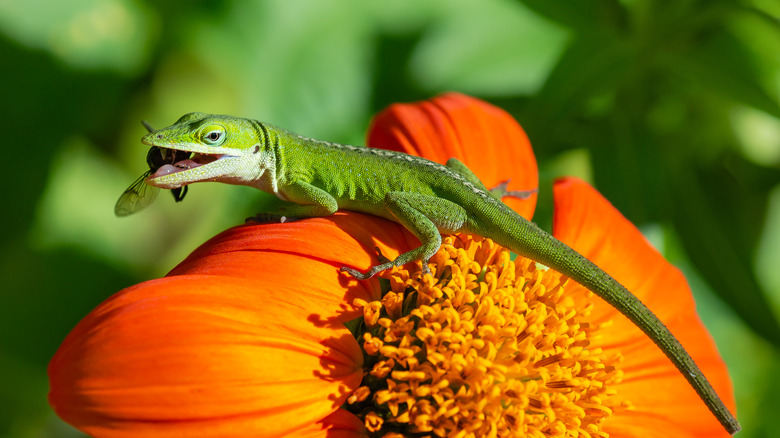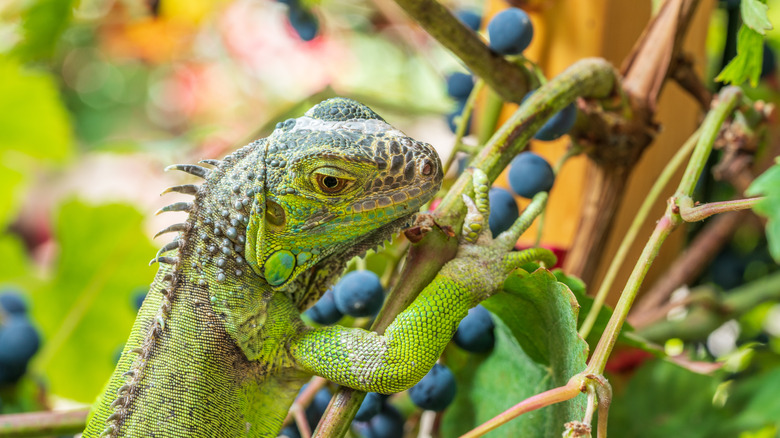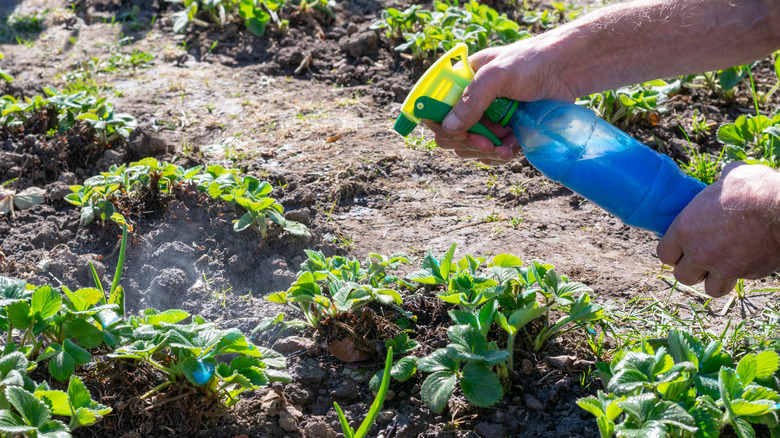How Lizards Really Affect Your Garden (And How Hot Sauce Could Get Rid Of Them)
Most lizards are helpers in our yards. They love to munch on the insects that, in turn, munch on our vegetables. You'll rarely see them since they spend most of their time hiding under rocks, decking, or leaf litter. If your garden is visited by one of the rare species that eat plants — like the invasive green iguana in Florida — or you're just plain afraid of small scaly creatures, you may have a valid reason for wanting them gone. A spritz of hot sauce spray at garden borders and around common lizard hiding places can deter these pesky critters. Use the spray with caution: it contains a compound called capsaicin that can negatively affect the health of pets and other wildlife, notes the National Pesticide Information Center.
Before you coat your backyard in spice, consider whether you really need to get rid of lizards at all. They're mostly insectivores — using lizards as a substitute for chemical pesticides is encouraged — and generally harmless to humans. Some native animals rely on lizards as a food source — if you want to attract more birds (like owls and hawks) and other wildlife to your yard, make it reptile-friendly. They may even help with seed dispersal, especially on islands, reports a 2021 study published in PLOS ONE.
Friend or foe?
However, in some American states, a few lizard species are considered true pests. Gardeners in South Florida are probably already familiar with the aforementioned green iguana from Central America. These honestly pretty big lizards — up to 5 feet long — will cheerfully rid your garden of shoots, buds, and other tender vegetation in no time. The burrows they dig can collapse, creating holes in your yard. The invasive and highly successful Cuban brown anole is threatening the habitat of native green anoles from Southern Georgia to Southern Florida. Anoles, too, occasionally eat plant seeds when favored food is scarce, so you don't want them around when planting new crops.
Beware of scare tactics. Some believe all lizards introduced to an area will automatically negatively affect the local ecosystem. Others say introduced species bring unknown diseases that threaten wildlife and even humans. In fact, there's little evidence to back up these assertions, reptile expert Dr. Russell Burke noted in an article for Hofstra Horizons, although he mentioned that it's a good idea to wash your hands if you happen to touch one. In some parts of the U.S., threatened or endangered native lizards are being selectively bred and re-introduced in an effort to boost their numbers. One example is the Texas horned lizard, a helpful ant eater once abundant in desert areas of the south-central United States. Gardeners testing out humane ways to get rid of lizards may hamper these efforts.
Use hot sauce with caution
If you have an influx of pest lizards or dislike the wee beasties jumping out at you when weeding, it might be time to deploy the hot sauce. Again, proceed with caution. The capsaicin found in chilies and peppers is a potent chemical irritant for humans and most other animals, per the Center for Research on Ingredient Safety at Michigan State University.
You'll need some hot sauce or cayenne powder, liquid dish soap, some fresh water, a large bowl or container, a mixing stick, a funnel, a spray bottle, and gloves. Fill your container with water — you want about a gallon of water for every 2 to 3 tablespoons of hot sauce or pepper powder. Alternatively, you can use half a cup of chopped fresh chilies to 2 cups of water. Mix thoroughly. Cover the container with a cloth or lid and let the mixture rest for up to two hours.
Place the funnel in the neck of your spray bottle and carefully pour in the liquid. Store your equipment somewhere safe and away from pets and children since it will now be permanently stained with dangerously concentrated spice. Apply the hot sauce spray to the perimeters of your yard, garden beds, select plants (during the morning or evening to avoid sunburn), and anywhere you've spotted lizards. The spray is natural, so it doesn't last long. Reapply often and after rain.


